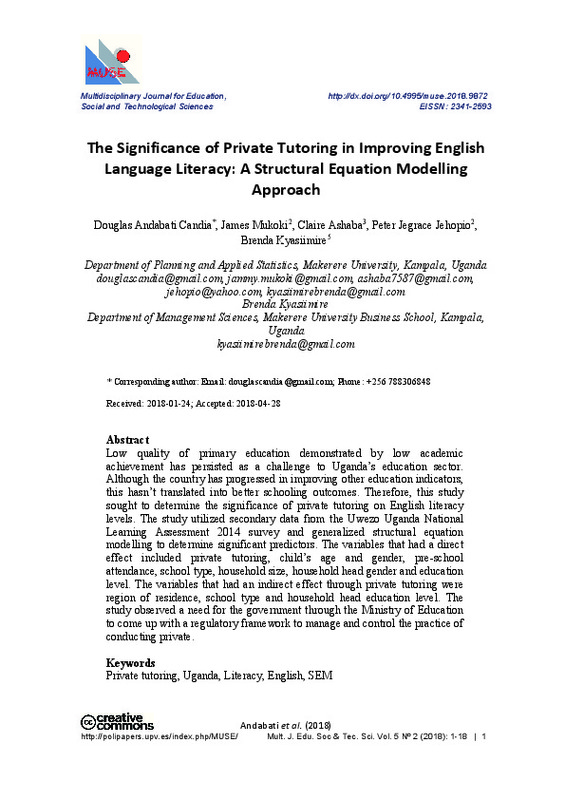Allen B. (2015). After-school tutoring increases academic performance. Journal of teaching, learning and scholarship, 2(3).
Braine M.E., Parnell J. (2011). Exploring student's perceptions and experi¬ence of personal tutors. Nurse Education Today, 31, 904-910. https://doi.org/10.1016/j.nedt.2011.01.005
Bray M. (2005). Private Supplementary Tutoring: Comparative Perspectives on Patterns and Implications. Paper presented at the Oxford International Conference on Education and Development, Oxford-UK. https://doi.org/10.1080/03057920601024974
[+]
Allen B. (2015). After-school tutoring increases academic performance. Journal of teaching, learning and scholarship, 2(3).
Braine M.E., Parnell J. (2011). Exploring student's perceptions and experi¬ence of personal tutors. Nurse Education Today, 31, 904-910. https://doi.org/10.1016/j.nedt.2011.01.005
Bray M. (2005). Private Supplementary Tutoring: Comparative Perspectives on Patterns and Implications. Paper presented at the Oxford International Conference on Education and Development, Oxford-UK. https://doi.org/10.1080/03057920601024974
Cole R. (2016). Estimating the impact of private tutoring on academic performance: primary students in Sri Lanka. Education economics, 25(2), 142-157. https://doi.org/10.1080/09645292.2016.1196163
Cooper E. (2010). Tutoring center effectiveness: The effect of drop-in tutoring. Journal of college reading and learning, 40(2), 21-34. https://doi.org/10.1080/10790195.2010.10850328
Crisp G, Cruz I. (2009). Mentoring College Students: A Critical Review of the Literature between 1990 and 2007. Research in Higher Education, 50, 525-545. https://doi.org/10.1007/s11162-009-9130-2
Das G.C., Das R. (2013). An empirical view on private tutoring in school mathematics of Kamrup district. International Journal of Scientific and Research Publications, 3(5).
Fowler J, Norrie P. (2009). Development of an attrition risk prediction tool. The British Journal of Nursing, 18(19), 1194-1200. https://doi.org/10.12968/bjon.2009.18.19.44831
Guerra-Martín M.D. (2015). Características de las tutorías realizadas por el pro-fesorado de los estudios de Enfermería de la Universidad de Sevilla. Sevilla: Punto Rojo Libros.
Guerra-Martín M., Lima-Serrano M., and Lima-Rodríguez J.S. (2017). Effectiveness of Tutoring to Improve Academic Performance in Nursing Students at the University of Seville. Journal of new approaches in educational research, 6(2), 93-102.
Guill K., and Bos W. (2014). Effectiveness of private tutoring in mathematics with regard to subjective and objective indicators of academic achievement Evidence from a German secondary school sample. Journal for Educational Research Online, 6(1), 34-67.
Jones, R., and Brown, D. (2011). The Mentoring Relationship as a Complex Adaptive System: Finding a Model for Our Experience. Mentoring & Tutoring: Partnership in Learning, 19(4), 401-418. https://doi.org/10.1080/13611267.2011.622077
NPA. (2015). Pre-primary and primary education in Uganda: Access, cost, quality and relevance. Kampala-Uganda: National Planning Authority.
Osborn D., Cutter A., and Ullah F. (2015). Universal Sustainable Development Goals: Understanding the Transformational Challenge for Developed Countries. London-United Kingdom: Stakeholder Forum.
The World Bank. (2013). Education and health services in Uganda. Data for results and accountability. Washington, D. C-USA: The World Bank.
Unal H., Ozkan M., Milton S., Price K. and Curva F. (2010). The effect of private tutoring on performance in mathematics in Turkey: A comparison across occupational types. Procedia Social and Behavioral Sciences, 2, 5512-5517. https://doi.org/10.1016/j.sbspro.2010.03.899
UNEB. (2015). Achievement of primary school pupils in Uganda in numeracy and literacy in English. Kampala-Uganda: Uganda National Examinations Board.
UNESCO. (2014). EFA global monitoring report 2013/14. Paris-France: United Nations Education, Scientific, and Cultural Organization.
Uwezo. (2016). Are Our Children Learning? Uwezo Uganda 6th Learning Assessment Report. Kampala-Uganda: Twaweza East Africa.
[-]








